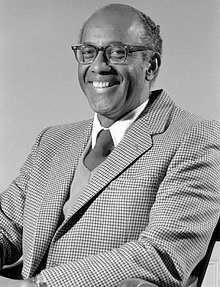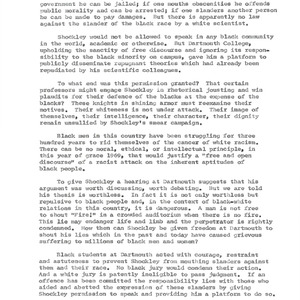Becoming a Forefather
A Familial Dynamic
The dynamics of my oral history interview with Mr. Noel felt new, yet familiar. We hail from disparate class backgrounds and, away from campus, would never have crossed paths. His dominance over me, though, was, while intimidating, spliced with an air of deja vu. Mr. Noel, a seventy-seven year old attorney, combated the premises of my questions, and even my beliefs, with unflinching fight. Beneath his criticality, however, was a gentleness that called me back to speaking with the elders of my own Black household. They interrogate those in the next generation, but with the aim of molding us into a cohort of folks more capable than they were. Seeing my face, and our racial ties, for the first time in our formal interview emboldened him to work on me. Hearing my personal anecdotes, Mr. Noel saw my anxiety at racial hardship, and tried transforming it into power.
"I think the value of all the other things that you can take from Dartmouth on top of or against what some of the difficulties will be, will far outweigh the difficulties, but it's up to you to make that happen."
- Edmond Noel
His Experience with Elders
Mr. Noel spoke fondly of Dr. Erroll Hill, the first Black tenured professor at Dartmouth, who acted as a father figure for Black students on campus during the late sixties. Dr. Hill, shaping Black youths to feel comfortable on campus, provided guidance and even opened up his home for events. Black students, many feeling like fish out of water in the predominantly white college, became close with him and his family. Dr. Hill’s protection of Black kids at Dartmouth went beyond their personal relationships, but he advocated for them to administration. When William Shockley, a Stanford lecturer, gave a speech on campus alleging the genetic inferiority of Black people in 1969, one year after the graduation of my narrator, Dr. Hill wrote several papers in defense of Black student protests (DHASRP, 2021). In contrast to other oral history interviews for the Dartmouth Black Lives project, Mr. Noel talked highly of his experiences with faculty, many of whom embraced him with open arms, like Dr. Hill. My mention of disturbing faculty encounters from JB Redding, class of 1976, prompted him to share his own positive ones. A link to her digital exhibit can be found here: J.B. Redding Interview
"But I was sexually harassed my first, I believe it was my first semester. Apparently this professor who sexually harassed me was a serial harasser."
- J.B. Redding on being sexually harassed by faculty
His Words of Wisdom
I felt that Mr. Noel sensed through my interview questions my hesitancy about fitting in at Dartmouth and took it upon himself to empower me, just as Dr. Hill did for him. He centered me by emphasizing the importance of staying focused on schoolwork. If you are academically stimulated, he seemed to argue, you won’t worry as much about other concerns, which are trivial in comparison. The confidence of Mr. Noel, who met me only weeks before, that I will succeed at Dartmouth worked to convince me that I will too. His logic was rooted in historical fact; if our ancestors could endure hell and live to tell about it, then I can survive here.
"People have come before you who have had far tougher barriers, taller barriers, stronger barriers, more hatred filled barriers, and they survived. And you will too. The college already decided if you're there, that you're capable of being that person."
- Edmond Noel


